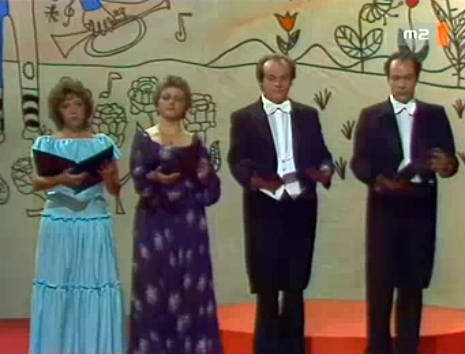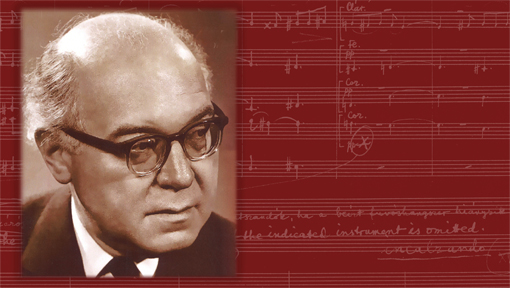
The “job artist” – chamber exhibition in memory of composer Ferenc Farkas
Composer Ferenc Farkas (1905-2000) was an outstanding figure of the 20th history of Hungarian music. He counted himself as one belonging to the “lost generation”, the career of whom was broken by World War II and the political confinement of the decades which followed. Farkas’ great oeuvre, the countless presentations of his compositions abroad and his legendary activity as a professor seem to contradict this disappointed self-image. During his long life, the composer had a highly successful career after all, despite historical tempests that brought about significant changes.
Several of Farkas’ compositions were written to fulfill special orders such as, for example, the music of quite a few famous Hungarian films (Emberek a havason (People on the Snow-Capped Mountains), Gyöngyvirágtól lombhullásig (From Lily of the Valley to Leaf Fall) , Két félidő a pokolban (Two Half Times in Hell) or Egri csillagok (The Stars of Eger, etc.) However, Farkas would also use Antal Szerb’s phrase “job art” as related to compositions which were not made to order, noting that for an artist, the ultimate goal cannot be mere self-expression. “My main aim is to revive old Hungarian music and to commemorate poets and great personalities. I call the more than one hundred songs and choral works which I have written a small Hungarian pantheon where poems written by Hungarian poets are revived” – he said in an interview given at the end of his life.
The bequest of Ferenc Farkas, kept in a wonderful order, got into Hungary’s national library as a donation of his son, conductor András Farkas. Our chamber exhibition, providing a cross-section of the oeuvre of Ferenc Farkas and, at the same time, presenting several rarities of personal relevance, will show some of the outstanding documents of this rich collection to the general public for the first time.
The exhibition will be opened during the morning hours of September 10, 2015, when NSZL will organize a half-day conference open to the general public. The conference will feature six lectures dedicated to some exciting features of the Farkas oeuvre.
 Topics include Farkas’ activities as a professor, his being a “polymath” of music and his efficient “manager’s approach”. As regards his best-known compositions, covered will be the highly popular Gyümölcskosár (Fruit Basket) cycle (written on poems by Sándor Weöres), Csinom Palkó (Go For It, Palkó) awarded with Kossuth Prize in 1950, as well as his late opera entitled Egy úr Velencéből (A Gentleman from Venice), composed on the basis of a play by Sándor Márai.
Topics include Farkas’ activities as a professor, his being a “polymath” of music and his efficient “manager’s approach”. As regards his best-known compositions, covered will be the highly popular Gyümölcskosár (Fruit Basket) cycle (written on poems by Sándor Weöres), Csinom Palkó (Go For It, Palkó) awarded with Kossuth Prize in 1950, as well as his late opera entitled Egy úr Velencéből (A Gentleman from Venice), composed on the basis of a play by Sándor Márai.
On top of that, visitors can watch excerpts from a retrospective interview made with Ferenc Farkas in National Széchényi Library in February 1994.
The exhibition will be opened in the Music Collection of National Széchényi Library, on Floor 6, until November 28, 2015.




